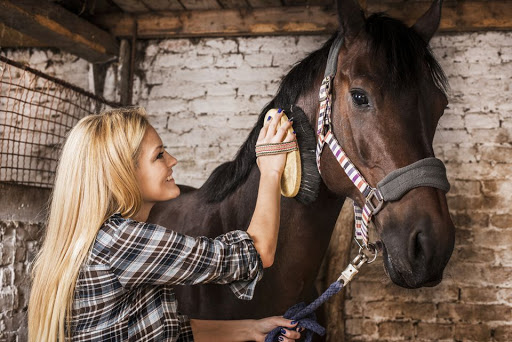5 Essentials To Care For Your Horse

Whether you're a first time horse owner or a seasoned pro, it's always worth checking up on the basics. We're going to run through all of the essentials that you need to care for your horse to make sure that you are on the top of your game.
Tacking Up
‘Tack' is all the equipment you put on your horse before riding. You should build up a stock of great quality tack, pay close attention to the fit and finish to ensure your horse is as comfortable as possible. You'll need your everyday riding essentials, such as saddles, stirrups, bridles, halters, reins, and bits. If you're a novice, then you should tack up with a pro to guide you every step of the way.
Once you've got the everyday tack ready and you know how to use it, you can move onto more specific items. These include martingales or breastplates for fast hacking and jumping, and pony boots to protect your horse's legs and tendons. This kind of equipment will dramatically improve your horse owning experience as they will keep your horse safe and secure while allowing you to take on more adventurous challenges together.
Grooming
Grooming is vital for your horse's welfare and to strengthen your bond. You should aim to groom your horse every day, but grooming before a ride is absolutely essential. Take the time to check your horse while grooming for sores, irritations, or any other ailments.
You should have a curry comb or a grooming mitt, a body brush, a mane and tail comb, a fine soft bristled finishing brush, and a hoof pick. These tools should be kept clean and tidy, and somewhere safely out of your horse's reach. It's worth considering some convenient storage solutions and lock boxes to keep your kit in top condition.
Stables
If you're lucky enough to have your own land to keep your horse on, then you'll need to invest in some high quality housing for your equine friend. If you already have a barn, then there are plenty of companies who can convert your indoors space into a stable. Alternatively, you can have a timber stable built on an appropriate patch of land.
Plenty of owners don't have the space on their property to adequately care for their horse, which is why boarding is such a popular option. When you board your horse, you pay for their space in a specialist stable with a team of staff who will care for your horse day to day. It's a great option to give you some peace of mind knowing that your horse is being looked after 24/7.
Safety
Now that we've covered the safety of your horse through tack, grooming and housing, it's time to make sure you're safe on horseback. You will need a good quality riding helmet, look out for ASTM approval as a promise of reliability. Torso-protecting safety vests are also available to really cushion the blow if you're unlucky enough to fall.
The key to safety is consistently checking your tack for signs of wear and tear. If anything is damaged or worn down, it is not safe to use. The other vital factor to be aware of is the horse. Always be aware of signs of agitation and distress, if your horse starts to seem uncomfortable, you should safely dismount at the first opportunity.
Bonding
If your horse does get spooked or distressed when riding, don't give up hope! Horses are intelligent and emotional animals, if you take the time with them, you can build a real and personal relationship.
Try taking your horse for a walk, give it a chance to spend time with you out in the wild. A nice, slow paced walk will give your horse time to get used to you being around so when you go on a ride it'll be glad you're there.
Horses are very clever animals, and they're great at problem solving, so why not try playing some games? You can set up obstacles, hide treats in objects or introduce new toys. This experience is great for the horse as it gets to spend time with you while simultaneously getting used to new situations, which will make it less spooked in the future.
The most important part of any of these steps is that you are around. Spend as much time with your horse as you can, it'll only be wary if you're a stranger! If your horse is boarding then you should visit as often as you can, and if you're fortunate enough to keep your horse on your own land, then you should be there all the time, especially at the start of your relationship. You need to know your horse, and your horse needs to know you.
839GYLCCC1992




Leave a Reply